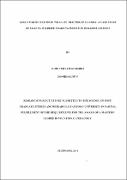Girl's participation in wildlife training in Uganda: a case study of Uganda wildlife training institute in Kasese district
Abstract
The purpose of the study was to investigate the girls' participation in Wildlife Training in
Uganda with a specific focus on Uganda Wildlife Training Institute. Objectives of the study
were; to analyze the academic factors affecting girls' participation in wildlife training activities,
to analyze the socio-cultural factors affecting the participation of girls in wildlife training and to
assess efforts put in place to improve the participation of girls in wildlife training.
The study employed qualitative research methods and established that the main motivation factor
of students' present programme of study is their desire for wildlife. A bigger number of students
don't get effective career guidance, and gender role models do affect students' participation in
learning process. There is no gender bias by teachers/instructors in training programs at Uganda
wildlife training institute however there is a large number of boys than girls.
The study further found that girls lacked confidence when it comes to practical and science
subjects. Girls demonstrate weakness when it comes to activities that require excessive muscle
exertion. The disparities in participation between boys and girls in training activities affect the
performance of students there are perceived gender roles in societies where students come from.
The study concluded that participation in wildlife training programs remains asymmetrical due to
the disparities in contribution between boys and girls. The academic factors as well as socio cultural
factors do favor the participation of male learners as compared to females in the training
programs and therefore affect their final performance and awards. The disparities between boys
and girls in wildlife training remain at large despite several efforts put in place by different
stakeholders to bridge the gaps.

